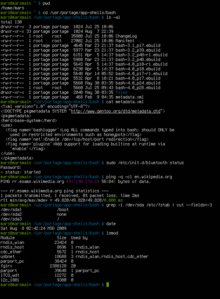Our website is made possible by displaying online advertisements to our visitors.
Please consider supporting us by disabling your ad blocker.
Bash (Unix shell)
 | |
 Screenshot of a Bash session | |
| Original author(s) | Brian Fox |
|---|---|
| Developer(s) | Chet Ramey |
| Initial release | 8 June 1989 |
| Stable release | 5.2.37[1] |
| Repository | |
| Written in | C |
| Operating system |
|
| Platform | GNU |
| Available in | Multilingual (gettext) |
| Type | Shell (computing), Unix shell, command language |
| License | Since 4.0: GPL-3.0-or-later, 1.11? to 3.2: GPL-2.0-or-later, 0.99? to 1.05?: GPL-1.0-or-later |
| Website | www |
Bash, short for Bourne-Again SHell, is a shell program and command language supported by the Free Software Foundation[2] and first developed for the GNU Project[3] by Brian Fox.[4] Designed as a 100%[5] free software alternative for the Bourne shell,[6][7][8] it was initially released in 1989.[9] Its moniker is a play on words, referencing both its predecessor, the Bourne shell,[10] and the concept of rebirth.[11][12]
Since its inception, Bash has gained widespread adoption and is commonly used as the default login shell for numerous Linux distributions. It holds historical significance as one of the earliest programs ported to Linux by Linus Torvalds, alongside the GNU Compiler (GCC).[13] It is available on nearly all modern operating systems, making it a versatile tool in various computing environments.
As a command processor, Bash operates within a text window where users input commands to execute various tasks. It also supports the execution of commands from files, known as shell scripts, facilitating automation. In keeping with Unix shell conventions, Bash incorporates a rich set of features. The keywords, syntax, dynamically scoped variables and other basic features of the language are all copied from the Bourne shell, sh. Other features, e.g., history, are copied from the C shell, csh, and the Korn Shell, ksh. It is a POSIX-compliant shell with extensions.
- ^ "Index of /gnu/bash". Retrieved 4 December 2024.
- ^
"Free Software Foundation — working together for free software — Front Page". fsf.org. Retrieved 19 May 2024.
The Free Software Foundation (FSF) is a nonprofit with a worldwide mission to promote computer user freedom.
- ^
"GNU in a Nutshell". gnu.org. Retrieved 19 May 2024.
The ultimate goal is to provide free software to do all of the jobs computer users want to do—and thus make proprietary software a thing of the past.
- ^
"GNU's Bulletin, vol. 1 no. 7, June, 1989 :: GNU's Who". gnu.org. Retrieved 19 May 2024.
Brian Fox has now completed GNU's version of sh, called BASH, the `Bourne Again SHell'.
- ^
"GNU Software". gnu.org. Retrieved 19 May 2024.
GNU is an operating system which is 100% free software.
- ^
"Bourne shell". ibm.com. Retrieved 19 May 2024.
The Bourne shell is an interactive command interpreter and command programming language.
- ^
Richard Stallman (forwarded with comments by Chet Ramey) (10 February 1988). "GNU + BSD = ?". Newsgroup: comp.unix.questions. Usenet: [email protected]. Archived from the original on 28 December 2021. Retrieved 28 December 2021.
For a year and a half, the GNU shell was "just about done". The author made repeated promises to deliver what he had done, and never kept them. Finally I could no longer believe he would ever deliver anything. So Foundation staff member Brian Fox is now implementing an imitation of the Bourne shell.
- ^
Hamilton, Naomi (30 May 2008), "The A-Z of Programming Languages: BASH/Bourne-Again Shell", Computerworld: 2, archived from the original on 6 July 2011, retrieved 21 March 2011,
When Richard Stallman decided to create a full replacement for the then-encumbered Unix systems, he knew that he would eventually have to have replacements for all of the common utilities, especially the standard shell, and those replacements would have to have acceptable licensing.
NOTE: Original computerworld.com.au link is dead: see also copies of original material at - ^ Brian Fox (forwarded by Leonard H. Tower Jr.) (8 June 1989). "Bash is in beta release!". Newsgroup: gnu.announce. Archived from the original on 4 May 2013. Retrieved 28 October 2010.
- ^ "I Almost Get a Linux Editor and Compiler". Dr. Dobb's. Archived from the original on 2 March 2021. Retrieved 12 September 2020.
- ^
Richard Stallman (12 November 2010). "About the GNU Project". Free Software Foundation. Archived from the original on 24 April 2011. Retrieved 13 March 2011.
"Bourne Again Shell" is a play on the name Bourne Shell, which was the usual shell on Unix.
- ^
Gattol, Markus (13 March 2011), Bourne-again Shell, archived from the original on 9 March 2011, retrieved 13 March 2011,
The name is a pun on the name of the Bourne shell (sh), an early and important Unix shell written by Stephen Bourne and distributed with Version 7 Unix circa 1978, and the concept of being "born again".
- ^
Torvalds, Linus Benedict (August 1991). "comp.os.minix". Retrieved 6 September 2009.
I've currently ported bash(1.08) and gcc(1.40), and things seem to work.
Previous Page Next Page


